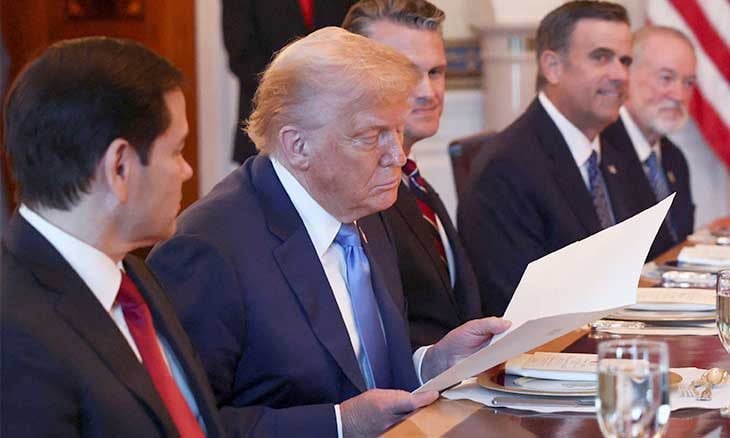Trump, Netanyahu, and the Nobel Peace Prize
Reflections on Donald Trump's pursuit of the Nobel Peace Prize and his nomination by highly qualified experts, such as Netanyahu.
8/19/2025


Trump, Netanyahu, and the Nobel Peace Prize
Gilbert Achcar
Donald Trump’s frantic pursuit of the Nobel Peace Prize has sparked widespread commentary in the international media, particularly as his obsession with the award has intensified since his return to the White House for a second term. This fixation traces back to his first term, stemming from his pathological jealousy towards Barack Obama, his predecessor. It has reached such a peak that Trump has been recently claiming a decisive role in brokering peace in two major conflicts despite strong objection by one of the parties involved in each case.
One such claim is about the military confrontation that erupted last spring between India and Pakistan. Trump asserted that he was key in halting the fighting, although India vehemently denied Washington’s merit in this regard. However, Asim Munir, Pakistan’s Chief of Army Staff (whose credentials as a peace-loving person are obvious enough), did nominate the US president for the Nobel Prize.
Trump also claimed to have played a key role in ending the twelve-day war between Israel and Iran two months ago. This claim is a height of irony: the war stopped after the United States joined the Zionist state’s aggression against Iran. Tehran naturally protested Trump’s peacemaking claim as a joke in very bad taste. Another height of irony is Benjamin Netanyahu’s nomination of the US president for the prestigious award.
During the visit he made to the White House a few weeks ago, the Israeli prime minister – a man famous for his unparalleled expertise in peacemaking – handed Trump a copy of his letter to the Nobel Peace Prize committee. In it, he praised the US president’s “dedication to promoting peace, security and stability around the world”, particularly in the Middle East, where Trump’s efforts “have brought about dramatic change and created new opportunities to expand the circle of peace and normalization”. Netanyahu concluded by saying, “I can think of no one more deserving than President Trump of the Nobel Peace Prize”.
Lest the readers be surprised by Trump’s self-nomination, or his nomination by Munir and Netanyahu, we should consider the illustrious history of the Nobel Peace Prize. It was previously awarded to Henry Kissinger (1973) and to Menachem Begin (1978) – two characters not much renowned historically for their dedication to peace. Barack Obama received the prize in 2009, only to set a record for drone strikes and targeted killings during his presidency. Likewise, Ethiopian Prime Minister Abiy Ahmed Ali was awarded the prize in 2019, only to launch a year after, in his country’s northern region of Tigray, a brutal war that killed over 100,000 people (more than 300,000, according to an academic study) and led to the displacement and starvation of millions.
With this history in mind, we must ask ourselves if Donald Trump does not deserve indeed to be nominated for the Nobel Peace Prize, or even to win it. Aren’t his staunch support for the Zionist army’s genocidal war on Gaza, and his call to deport the Strip’s population to make room for US real estate development, two outstanding instances of peacemaking efforts well deserving recognition? By the same logic, why not nominate Benjamin Netanyahu himself for the venerable award? Let us therefore launch an international petition asking the Norwegian jury to award the Nobel Peace Prize to the Israeli prime minister.
We would thus be following in the footsteps of Swedish MP Erik Brandt, who in 1939 sent a letter to the same committee nominating “German Chancellor and Führer Adolf Hitler”. Brandt argued that Hitler “more than anyone in the world has deserved this highly respected reward”. While the Swedish MP’s letter was intended as sarcasm, it was taken seriously by many at the time. Today, there seems to be little irony in Trump’s Nobel nomination by his flatterers. Netanyahu’s supporters might even view our proposal as earnest.
Translated from the Arabic original published in Al-Quds al-Arabi on 19 August 2025. Feel free to republish or to publish in other languages, with mention of the source.